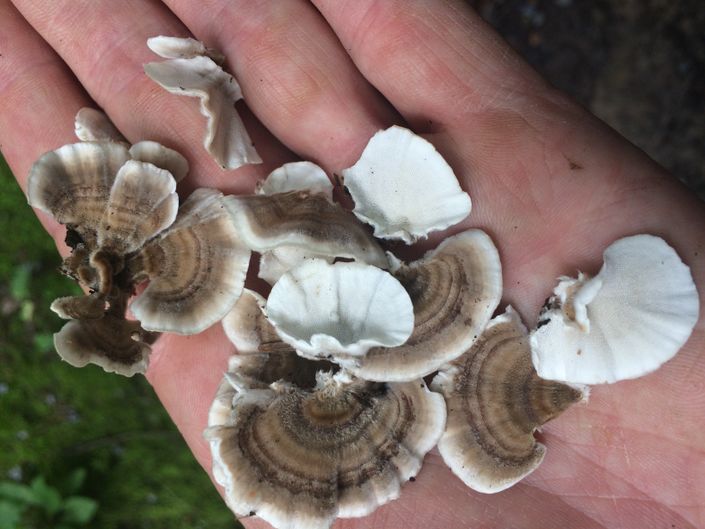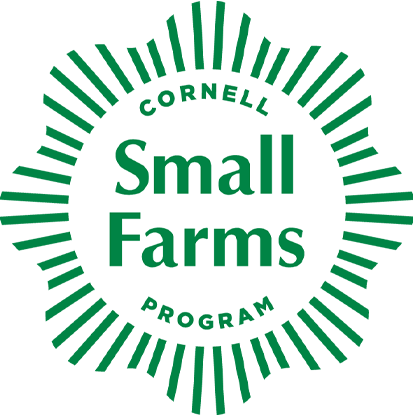
BF 149: Identifying and Partnering with Mushrooms in Farms, Gardens and Forests
Fungi for Food, Medicine, Materials, and Remediation
Enroll in Course
Learn basics in mushroom identification, life cycle, and potential applications of mushrooms to solve community level challenges.
Mushrooms are a fascinating set of organisms that are part of the larger set of fungi which includes yeasts, molds, and a host of other species. They are quickly gaining popularity for a wide range of applications from food to medicine to cleaning up toxic pollutants.
This course offers connection to a community of fungi enthusiasts, as well an overview of foundational knowledge needed to understand how mushrooms might play a role in your farm and/or greater community.
Students will learn the basic biology and life cycle, how to properly harvest and identify a specimen, and receive basic information and examples of ways humans are using mushrooms successfully depending on their goals and context.
While not required, this course is an excellent starting point for anyone curious about mushrooms as a prerequisite to our cultivation deep-dive courses including BF 151: Outdoor Mushroom Growing and BF 153: Indoor Mushroom Growing.
Target Audience
All levels - This course is for new farmers, experienced farmers, and community members seeking to incorporate fungi into their practice. It's also relevant to woodlot owners, backyard and urban gardeners, as well as anyone who has access to forested or green space. Mushroom growing is an easy topic for beginners with some experience in gardening, farming, and managing crop systems. This class encourages diverse, accessible, and community-centered discourse and approaches.
Course Objectives
At the completion of this course, you will:
- Be able to describe basic biology and life cycle of fungi and mushrooms
- Know the proper process for safe harvest and identification
- Learn methods for propagating and cultivating mushrooms
- Discover medicinal mushrooms and their uses
- Consider applications of mushrooms for materials and remediation of toxins in the environment
- Better understand mushroom production and use from a cultural perspective
Webinars
The bulk of the course happens on your own time, with discussions, readings, and assignments in Teachable, our virtual classroom. To add to the experience, webinars will be woven into the online interface of the course to allow you to meet on a weekly basis to learn from outside presenters and ask questions to address your farm issues in real time. If you miss one, they are always recorded and posted for later viewing.
Webinar Schedule
Live instruction for 2025 has concluded. You are welcome to enroll now to complete this course on a self-paced schedule and join our next live session in 2026-27. All webinars are recorded and posted in your online classroom to watch anytime. Once enrolled in this course, you will retain access to all materials indefinitely and may return to participate in future live offerings of the course as well. We hope you will join us!
Your Instructor

Sneha Ganguly also known as Kali Mushrooms, is an interdisciplinary artist working through the intersection of fine art and mycology. Sneha studies wild fungi with a special interest in biomaterials and pigments, and creates handmade mushroom papers, inks, paints, dyes and extracts. Sneha is co-founder of POC Fungi Community, a grassroots organization that aims to increase BIPOC access and representation in mycology. Sneha is a co-facilitator for the Community Mushroom Educators Training program at Cornell Small Farms. She also founded NYC's inaugural Fungus Festival as part of the New York Mycological Society.
Cecilia De La Fuente,
an anthropologist and Community Mushroom Educator with Cornell Small
Farms Program, has specialized in sustainability and urban agriculture
having worked on diverse projects related to these topics. Currently,
she leads Cosmoplantitas, a project focused on experimenting with
accessible methods for cultivation and developing nutritional products
to promote mushroom consumption as a more sustainable alternative.
Connie Walker (she/her/they) is a Community Mushroom Educator (CME) who loves to identify interconnections in nature and all life. Connie has a background as a classroom teacher and mental health counselor by training but, prefers the outdoor classroom to the indoor. She especially likes helping mushrooms grow. Connie is the owner and operator of a wooded urban lot in Erie, Pennsylvania called, The MushRoom; a demonstration garden and outdoor classroom dedicated to the love of mushrooms.

Student Testimonials
“A great introduction to the giant field of fungi.”
“The instructors were informative and careful in explaining difficult and also complex topics.”
“This experience offered a nice opportunity to see how people are implementing these practices in their own properties.”
“I have enjoyed watching how the course has given me a new perspective on how land responds to our actions, and being able to think about what is going on around and also underneath the soil to see how it can be a fully functioning ecosystem for all that it supports. I am planning on learning more about the specific parts of the land that are really interesting, and teaching other people about how nature is self-efficient and multifaceted, similar to human environments as part of nature, and learning about what times of year are the best to survey the land and where to look is something that I always will find valuable in this regard.”
Course Curriculum
-
StartInstructor Contact Information
-
PreviewWebinar Schedule and Participant Guide
-
StartFORUM: Introduce Yourself
-
StartPre-Course Survey
-
PreviewKiva US - 0% interest loans up to $15,000
-
StartNavigating in Teachable; Getting a Course Completion Certificate; and More
-
StartShort Survey; Tell us about yourself and taking the class!
-
StartFORUM: Ask any questions here
Frequently Asked Questions
Online Course Tiered Pricing
The Cornell Small Farms Program offers a tiered pricing model to provide greater access to our online courses. To determine your course enrollment cost, please consult the chart below, and honestly identify your current financial situation.
We realize that not everyone is able to afford the price of our courses, so we also offer a small number of scholarships each year to New York State residents. To apply, please read scholarship requirements and complete the application here.
Learn from successful farmers and start turning your farm dreams into reality today!
